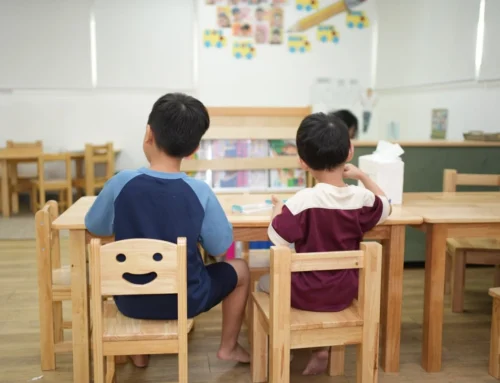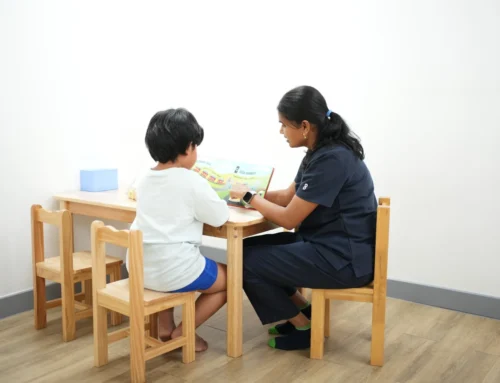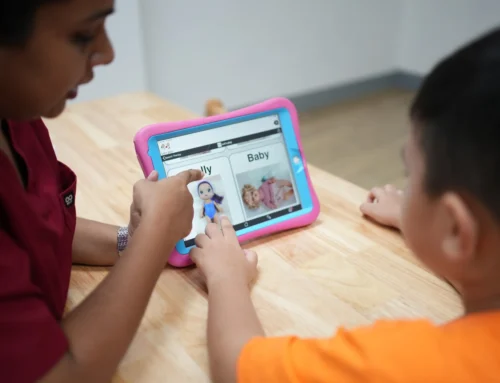When children struggle to express their thoughts, needs, or emotions, the impact goes far beyond delayed language milestones — it touches their confidence, relationships, and emotional well-being. At OrbRom Center in Phnom Penh, we see every day how communication challenges can lead to frustration and emotional stress for children and their families. Understanding these emotional struggles is the first step toward meaningful support through speech therapy and early intervention.
When Words Don’t Come Easily: Understanding the Emotional Impact
Every child wants to be heard and understood. But for those with speech or language difficulties, everyday communication — whether asking for help, joining a game, or answering a question in class — can feel overwhelming.
When a child can’t communicate effectively, emotions often become their language. You might see tantrums, withdrawal, crying, or sudden anger. These are not signs of “bad behavior” but rather expressions of deep frustration and anxiety.
Children in Cambodia, where classrooms often emphasize group learning and verbal participation, may feel even more isolated when they can’t keep up with peers. Over time, these experiences can lead to low self-esteem and reluctance to engage socially or academically.
The Hidden Emotional Toll of Communication Barriers
1. Frustration and Behavioral Outbursts
Imagine trying to explain a need or feeling but being constantly misunderstood. For many children with speech delays, this is a daily struggle. The inability to communicate can cause stress that often shows up as tantrums, aggression, or withdrawal. Parents and teachers may misinterpret these reactions as defiance rather than signs of emotional distress.
Speech therapists at OrbRom help children replace frustration with success by teaching them practical communication tools — from words and gestures to Augmentative and Alternative Communication (AAC) systems when needed.
2. Anxiety and Social Withdrawal
Children who find speaking difficult may start avoiding group play, storytelling, or classroom discussions. In Phnom Penh schools, where English and Khmer are often blended in lessons, this challenge can feel even greater.
Speech difficulties can make children overly self-conscious, especially if others react with impatience or laughter. This can lead to anxiety, social withdrawal, or selective mutism, where the child speaks only in certain situations. With proper guidance and therapy, children can regain confidence and reconnect with friends and classmates.
3. Low Self-Esteem and Emotional Confusion
When communication breaks down, so does self-expression. A child who can’t name their feelings may bottle them up, leading to sadness or emotional outbursts. Over time, they may start believing they are “less capable” than others.
Speech therapy helps rebuild this confidence by giving children the tools to name emotions, use clear words, and celebrate progress. At OrbRom, we emphasize teaching emotions through speech therapy to help children recognize, label, and manage their inner world more positively.
How Speech Therapy Supports Emotional Growth
Creating a Safe Space for Expression
A skilled speech-language pathologist does more than teach sounds and words — they create a safe, judgment-free space where children feel heard. Through play-based sessions, songs, and storytelling, children begin to trust their voice and enjoy communication again.
At OrbRom Center, our speech therapy in Phnom Penh combines evidence-based strategies with compassion and cultural understanding. Each session is tailored to the child’s comfort level, gradually building confidence and emotional resilience.
Collaboration Between Therapists, Parents, and Teachers
Speech therapy success grows from teamwork. Parents and teachers play a vital role by reinforcing positive communication habits at home and school. Activities like daily speech routines, reading together, or using simple sign language can help children express themselves more freely and reduce emotional frustration.
Our assessments at OrbRom identify not just language delays but also emotional and social factors affecting communication. This holistic understanding allows us to design personalized special needs interventions that support the child’s overall development.
From Silence to Confidence: The Path Forward
When children find their voice — whether through words, gestures, or AAC tools — their emotional world transforms. They begin to connect, laugh, share stories, and build friendships with newfound confidence.
At OrbRom Center, we believe that communication is the foundation of emotional well-being. Through consistent speech therapy, patient guidance, and family support, every child can move from silence to self-expression — from frustration to joy.
If you notice your child struggling to express emotions, don’t wait. Early intervention can make a life-changing difference. Contact us today to learn how our team in Phnom Penh can help your child build both communication and emotional strength.
We are the only Preschool specialized on children with special needs in PhnomPenh.
- Internationally qualified teachers
- Cambodia’s largest sensory room
- Outdoor swimming pool
- Covered outdoor playground
📞 Phone: 077.455.993
Telegram Link: https://t.me/OrbRom





